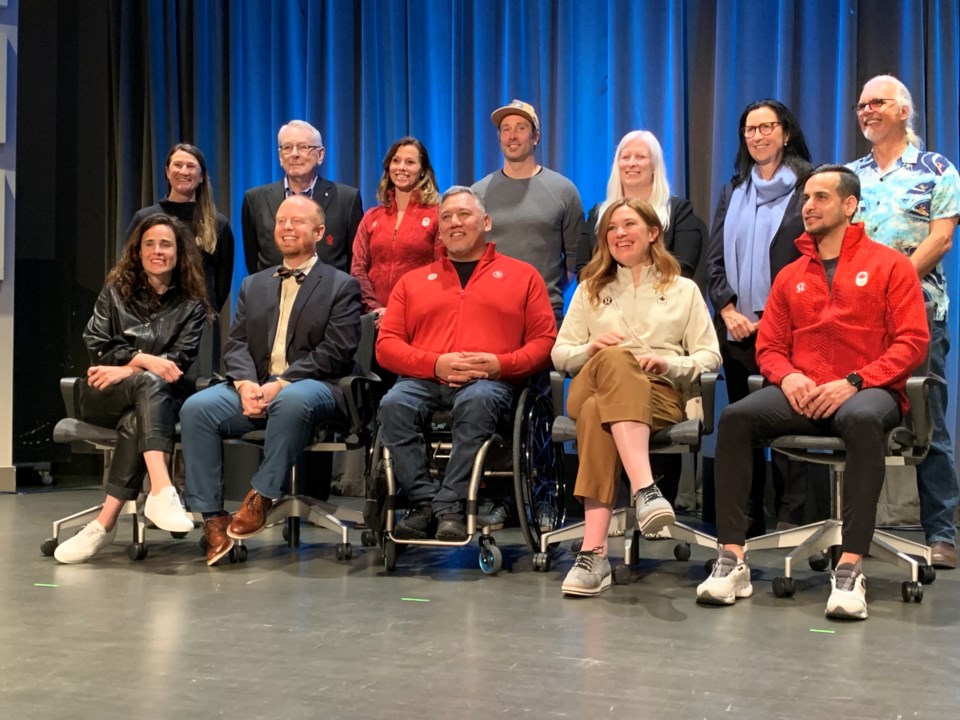Creating an Olympic movement that is inclusive, welcoming and sustainable—that was the takeaway from the Whistler Institute’s April 21 panel discussion, titled The Role of the Olympic Movement in an Ever-Changing World.
The event at the Whistler Conference Centre featured a diverse slate of speakers made up of Olympians, Paralympians and sport advocates including Catriona Le May Doan, Clara Hughes, Seth Wescott, Hamoon Derafshipour, Richard Peter, Richard Pound, Tricia Smith, Chief Willie Littlechild and Hannah Burns. The discussion was moderated by Whistler Mayor Jack Crompton.
According to Canadian Olympic Committee president Tricia Smith, the role of the Olympic movement is to use sport to bring the world together with no barriers to entry.
“I think it’s clear that sport plays a huge role in bringing the world together and in the future of what’s possible,” said Smith.
“People ask me sometimes what I hope for the Olympic and Paralympic movement for the future, and I always say, wouldn’t it be great if 10 years down the road we can say, ‘can you believe there was a time when any kid who wanted to play, any person who wanted to play sport, didn’t have that opportunity? Can you believe that that was possible, and people didn’t have that opportunity?’”
The Olympic movement has changed significantly since it first began as an annual event in Athens, Greece, in 1896. The Olympics have gone from a small summer event, with less than 300 athletes and 14 nations competing against each other, to a truly global affair featuring more than 14,000 athletes from 206 countries. (Only 193 of which are United Nations members.)
A key part of the discussion on the future of the Olympics was sustainability. Historically, the Olympic Games have been an expensive event to produce. Cities would often get into bidding wars costing millions before a shovel even hit the ground. Countries would commonly pour billions of dollars into sporting infrastructure, with it sometimes becoming under-utilized as soon as the games ended.
The steady increase in cost to put on the Olympics has given some nations and cities pause when it comes to hosting the Games. Going forward, the Olympic movement wants to make hosting the games more accessible with long-term legacy plans for future infrastructure.
“They don’t want communities to build anything that you wouldn’t want to build anyways. It’s all about sustainability,” said Smith. “It’s all about equality ... the Games’ concept has completely changed.”
When constructing venues for future Olympic Games, the venues’ purpose beyond the event itself has to take a strong focus, added Hannah Burns, associate director of Olympic Games Promotion with the International Olympic Committee.
“For something to be built ... Is there an extremely robust and strong legacy plan?” she said.
“[Whistler] is a community where you see the benefits of certain infrastructure changes that were done and were made and what that legacy is. That is essential to us, and the process that we have put in place ensures us to thoroughly review that and what that process is and to ensure a community thinks that through.
“So really, it may sound like a slogan of sorts, but for us, it is adamant in everything that we do that a city does not change for the Games, the Games change for a city.”
On Dec. 10, 2021, B.C.’s Squamish, Lil’wat, Musqueam and Tsleil-Waututh First Nations announced they intend to with the City of Vancouver and Resort Municipality of Whistler.
In February, the Canadian Olympic Committee announced that a feasibility assessment and initial concept development is underway, after which a full assessment will follow.
A decision on a formal bid is expected in the fall.
Check back with Pique next month for more on the prospective 2030 bid.
A recording of the April 21 Whistler Institute event will be uploaded soon—sign up for the organization’s newsletter at to be notified when it is available.




